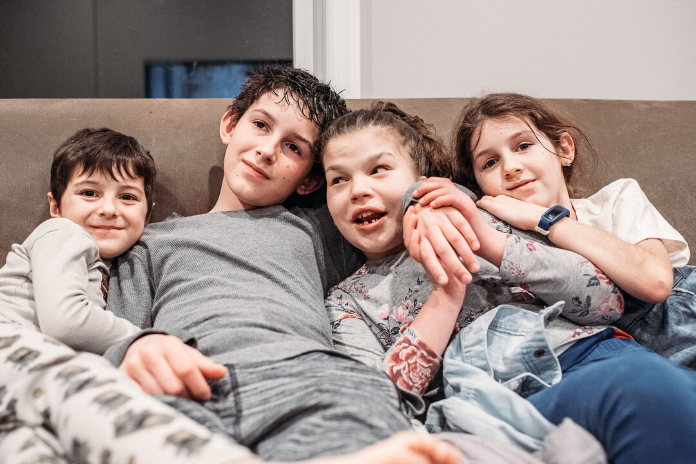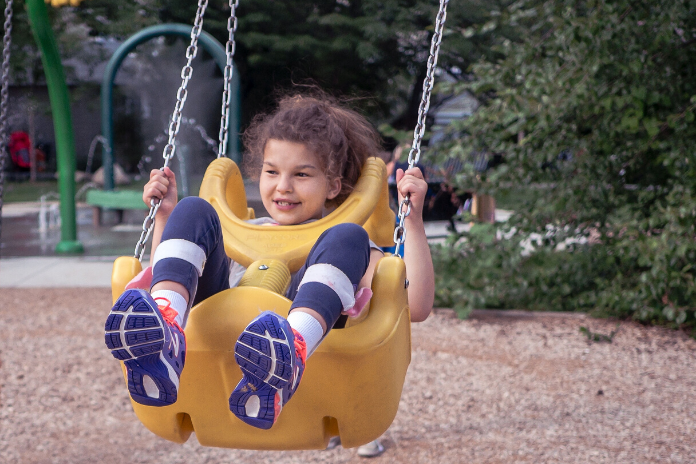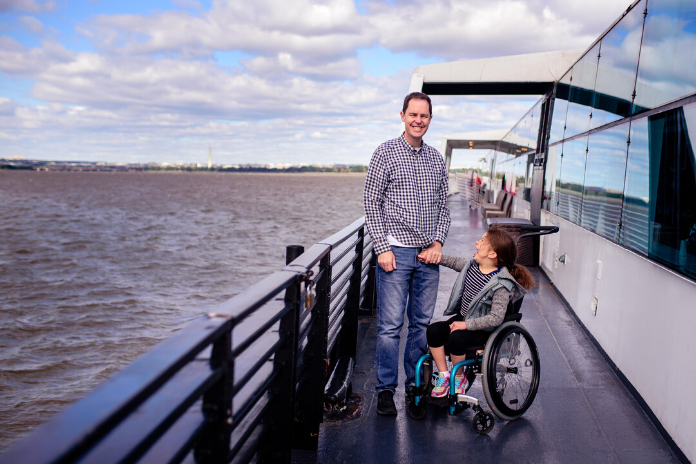
After her oldest daughter, Claire, was born with significant medical and support needs, Jamie Davis Smith made the decision not to return to her full-time job as an attorney. She still does some legal work and teaches classes related to law, but Smith also explores her creative side as a writer and photographer.
Here, the D.C. mom of four (ages 5-13) talks to Washington FAMILY about what it’s like to raise a daughter who requires special care and the advice she has for other parents of children with disabilities.
What’s the most challenging things about raising a child with disabilities?
Raising a disabled child in a world not designed to welcome her is difficult. We often run into buildings that are not accessible or people who do things like sit in the handicapped accessible seats at movie theaters or park in handicapped spots when they do not have a placard, leaving us at times with no way to access the activities we should be able to easily. I normally spend at least a few hours a week on the phone with doctors’ offices, pharmacies and my daughter’s health insurance companies trying to arrange her care and make sure it’s covered under her plans.
I also worry all the time about whether I am doing enough for her and whether the care she needs will be available to her, especially with ongoing attacks on the Affordable Care Act and threats to cut funding to Medicaid and special education.
 What’s the most rewarding thing?
What’s the most rewarding thing?
I love my big, unpredictable, loud family. I love seeing Claire’s younger siblings interact with her. My youngest is eight years younger than Claire, but very early on he inserted himself into a caregiving role by helping administer her medications, pushing her wheelchair and making sure she had her special lovey at night.
My oldest son is only 17 months younger than Claire, and from the time he was very young would always make sure Claire got her fair share and was treated fairly. It was not unusual, for example, for someone to offer him a balloon but not her. He would always speak up and make sure she got a balloon, too. Even today he makes sure Claire is treated well and has a good life by periodically planning a “Claire’s Day,” where he plans out a schedule of all of Claire’s favorite activities from swimming to eating pizza and ice cream.
Claire’s sister is also very good with her and is always willing to care for her and make sure is comfortable. It brings me great joy to watch their relationships develop and deepen. Since things are so much harder for Claire, it is so rewarding to watch her reach her goals. Although she still primarily gets around with a wheelchair, it was so wonderful watching her take her first steps when she was seven and to watch her face dawn with the realization that she could communicate by using signs and pointing.
 What support systems do you have in place?
What support systems do you have in place?
We don’t have any family nearby, which has been a challenge. We have good friends who love Claire like their own and help in a pinch. Claire gets very good support through Medicaid in the form of a home health assistant and adaptive equipment, such as a medical bed and feeding chair, that allows us to keep her at home.
We have also found a couple of overnight respite programs that Claire attends periodically without us. They have activities such as canoeing and swimming which Claire loves and that gives us a bit of a break and a chance to sleep through the night.
How do you take care of your own mental health and well-being?
To be honest, this is not always something I do well but should focus on more. I do not have a lot of time to myself, so I focus on what I can do. I make reading and a cup of hot tea part of my nightly routine. While it’s not much, it gives me something to look forward to at the end of the day.
When I’m able I try to get a pedicure and massage a few times a year or sneak off to a movie without kids once in a while. I also try to give myself grace on hard days.
 What advice do you have for other parents of children with disabilities?
What advice do you have for other parents of children with disabilities?
Reach out to adults with disabilities to get a better understanding of what your child’s life is like from their perspective. ADAPT and the Autism Self-Advocacy Network can be good places to start. Seek out books and movies like “Crip Camp” that tell the story of what it is like to be disabled from the perspective of people with disabilities.
Find parents going through similar experiences to share stories and resources. Many disabilities have support groups for parents centered around a diagnosis. There are also advocacy groups where you may find your tribe and be able to advocate for your child at the same time.
Approach other families of children with disabilities when you see them at school pick-up or in your community. Learn to speak up and be prepared to fight for your child. It’s okay to have hard days.
Get to know Jamie Davis Smith:
Favorite indulgence: Fudge from the Jersey Shore
TV show you’re watching: “The Plot Against America”
Book you’re currently reading: “Circe”
Favorite local restaurant: It’s a tie between Little Beast and Pete’s APizza
Favorite family activity: Amusement Parks and accessible hikes
5 things in your purse: Phone, Tile to find my lost keys, lip balm, hand lotion and a pen
Biggest pet peeve: Being interrupted while I’m on the phone (this happens a lot)
Dream vacation: A mountain retreat in Latin America
Favorite quote or mantra: It’s fine, I’m fine, everything’s fine.
Do you want to share a day in your life or a personal story about parenting with Washington FAMILY readers? Email our editor, PJ Feinstein, at [email protected] to learn how you can write for our website.







